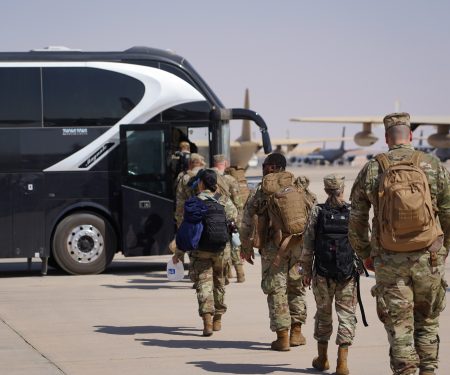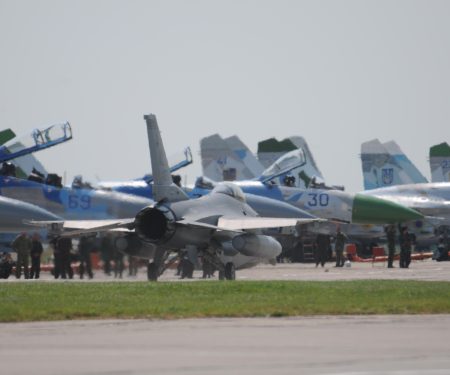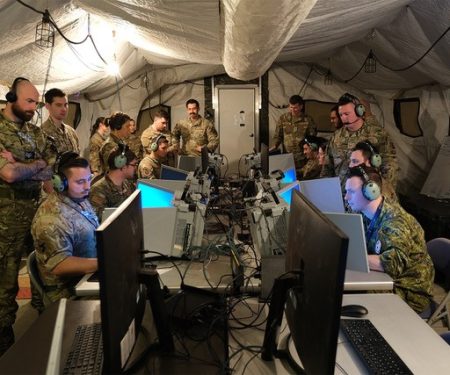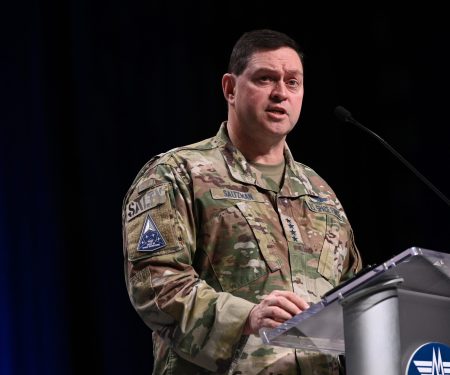Radar Sweep
Kremlin Foe Alexei Navalny’s Team Confirms His Death and Says His Mother Is Searching for His Body
Alexei Navalny’s spokesperson confirmed Feb. 17 that the Russian opposition leader had died at a remote Arctic penal colony, saying he was “murdered,” but it was unclear where his body was as his family and friends searched for answers. Navalny’s death at age 47 has deprived the Russian opposition of its most well-known and inspiring politician less than a month before an election that will give President Vladimir Putin another six years in power.
ANALYSIS: How War in Europe Boosts the US Economy
Proponents of support for Ukraine usually invoke U.S. strategic interests or moral obligations. Lately, they are making a more calculating case: It is good for the economy. In the two years since Russia invaded Ukraine, the U.S. defense industry has experienced a boom in orders for weapons and munitions.
Houthis Say They Shot Down a US Drone Off Yemen
The Pentagon is investigating the cause of a crash of an American military surveillance drone off the coast of Yemen on Feb. 19, two U.S. officials said. The officials, speaking on the condition of anonymity to discuss operational matters, confirmed that the drone, an MQ-9 Reaper, fell out of the sky. Iranian-backed Houthi militants said on Feb. 19 that they had downed the drone near the port city of Al Hudaydah, in western Yemen.
‘There’s Only Plan A': Defense Leaders Fear Failure in Ukraine
Four American senators recounted a story Ukrainian officials told them at the Munich Security Conference: A soldier in a muddy trench with Russian artillery exploding nearby, scrolling on his phone for signs the U.S. House would approve military aid. Sen. Sheldon Whitehouse (D-R.I.), leader of one of the congressional delegations, said it was “heartbreaking” to hear the tale. “For young Ukrainian soldiers on the front lines, this is a persistent topic of conversation,” the senator relayed, a somber tone in his voice.
Don’t Do Business with China in Space, US Space Force Warns
The international community should avoid doing commercial space business with China because it will support further growth of the nation’s burgeoning military space operations, a senior U.S. Space Force intelligence chief cautions. The warning comes as commercial space launch activity is growing dramatically in China, partially at the expense of Russia, which has seen its international space launch business collapse in the wake of its invasion of Ukraine and the actions of Russian space agency Roscosmos under its former chief Dmitry Rogozin.
PODCAST: F-16 at 50: The Viper Goes to War
In Episode 168 of the Aerospace Advantage podcast, host John “Slick” Baum chats with retired Lt. Gen. Bruce “Orville” Wright, a Fighter Weapons School Graduate and F-4 and F-16 pilot with 3,200 hours of flight time and 65 combat missions in the F-16; Heather “Lucky” Penney, who flew two combat tours in the F-16, but most notably found herself scrambled on the morning of Sept. 11, 2001, to defend the national capital region; and Lt. Col. Maxwell “Efes” Cover, who cut his teeth as a young fighter pilot in the F-16, and is now an F-35 pilot.
Pain, Punishment, Push-Ups: Air Force Basic Training Is Still a Bear, But There's Less Screaming
Each year, thousands of civilians undergo rigorous training at Joint Base San Antonio-Lackland to become U.S. Air Force airmen. The training involves physical challenges and mental conditioning aimed at transforming recruits into resilient and disciplined individuals. The traditional harsh "shark attack" approach has been replaced with a more gradual introduction to military life during Zero Week.
Air Force Weighs Future of Osprey as Months-Long Grounding Continues
The Air Force has launched a “comprehensive review” of its CV-22 force after a deadly crash killed eight airmen and the Pentagon grounded its entire fleet of Ospreys. The review will determine whether the CV-22 force is “appropriately organized, trained and equipped for safe, effective, and efficient special operations,” said Air Force Special Operations Command chief Lt. Gen. Tony Bauernfeind.
As US Funding Remains in Limbo, Northrop Chases Exports for F-16 EW Suite
Northrop Grumman has locked up two international customers for its new electronic warfare (EW) suite for the F-16 Fighting Falcon, the start of what the company hopes will be a lucrative expansion of its system abroad with U.S. funding uncertain an executive tells Breaking Defense. In an interview at the Air and Space Forces Association’s Warfare Symposium, Northrop’s vice president for Navigation, Targeting and Survivability James Conroy argued that with the explosion of EW around the globe, equipping systems with proper EW capabilities should be a top priority for global customers.
Space Force to Study Cape Canaveral Launch Sites for Starship
The U.S. Space Force is preparing to kick off environmental studies that could lead to SpaceX Starship launches from either the Cape Canaveral facility used by the Delta 4 or a new complex. A new website outlines plans by the Department of the Air Force, which includes the Space Force, to prepare an environmental impact statement (EIS) regarding Starship launches from Cape Canaveral Space Force Station. Such a review is required by the National Environmental Policy Act for any major action, like construction of a new launch complex.
The US Military Already Has a Decades-Old Countermeasure for Russian Space Nukes
The national security of the United States is currently imperiled by a new threat from Russia, according to the White House: a “troubling” emerging, anti-satellite weapon that, while ostensibly incapable of “physical destruction” on the ground, could severely disrupt U.S. military and civilian operations in outer space. Some U.S. government officials suspect the system may be nuclear, a prospect that raises concerns that the Russian government could not only disable strategic satellites in orbit, but, in turn, deal a major blow to the U.S. economy by degrading both government and civilian space-based operations. ... Luckily, the U.S. military has a relatively simple countermeasure in place to deal with space-based weapons: just send up a fighter jet to blow the damn thing out of the sky. After all, the Air Force had done it before—once.




